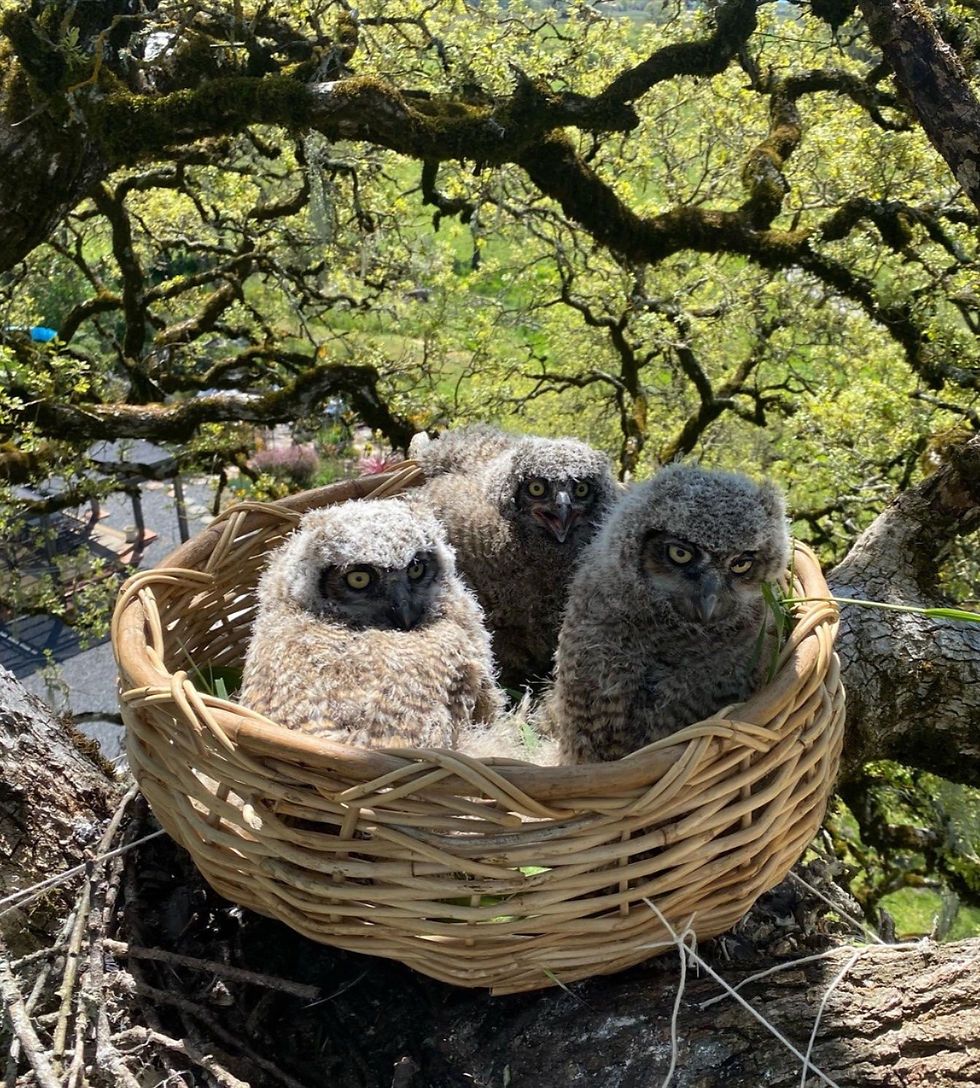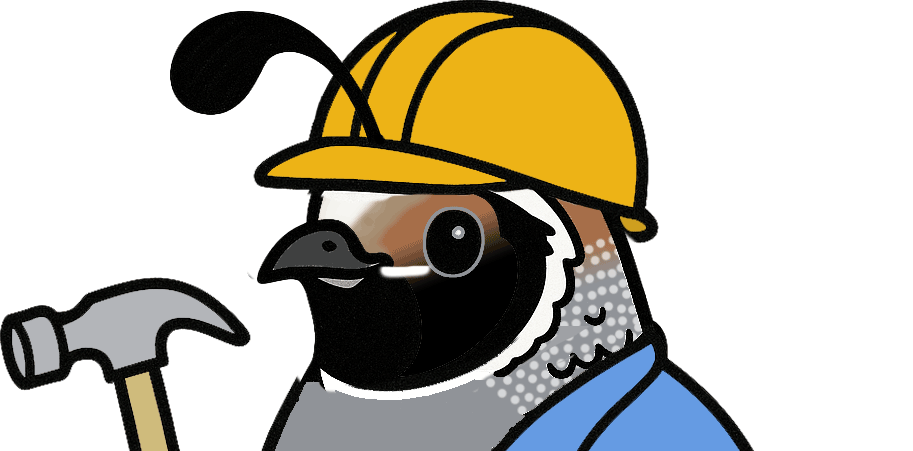Happy Endings and New Beginnings
- May 19, 2023
- 4 min read
Updated: Oct 15, 2023
Happy Endings and New Beginnings
Baby Bird Season is in full swing, bringing in an average of 20+ birds per day. Adding to the hectic pace, we are starting to receive more active and potential HPAI birds as well. Thankfully we continue to add new volunteers to our ranks—a true blessing during this busy time of year.
There's Nothing Better Than Reuniting A Family...
Especially If You Can Foster An Orphan At The Same Time!

Our first two Great Horned Owl babies this year arrived just two days apart. Both had fallen considerable distances from their nests. But despite their perilous beginnings, the end of their journeys was more perfect than we could have hoped for.
Unlike other owls and falcons, Great Horned Owls do not construct nests of their own. Instead, they will take over abandoned nests, use naturally occurring platforms or, in some rare instances, settle into large cavities. Sometimes nest options are less than ideal. And since these owls do not repair or improve any of the sites they claim, accidents can quickly escalate into disaster when nestlings tumble from nests that are too flat, too small, or are literally disintegrating out from under them.
Despite their lack of housekeeping skills, Great Horned Owls make fiercely devoted parents and will continue to provide for a nestling even if it is grounded. So while babies who fall from the nest need help, it's not at all uncommon for their watchful parents to be keeping a close eye on them and bringing them food.

The first baby owl came from a small redwood tree located in a parking lot in Petaluma. Parts of the disintegrated nest and leftover owl food littered the ground around the tree's base. Both a parent and a sibling were spotted up in the tree during the initial site visit, however the high level of human activity and lack of a safe nest made this location less than ideal.
Apparently the owl's parents reached the same conclusion. A second site visit revealed the tree had been abandoned and neither parents nor the sibling were found.

Meanwhile, a second baby Great Horned Owl arrived after falling from an enormous, twisting oak in northwest Santa Rosa. Our reconnaissance team happily reported they found evidence of parental activity and, even better, a sibling still in the nest!
With our first owlet from Petaluma now officially an orphan, we began making plans to foster him in with this second baby owl. Great Horned Owls are not only devoted parents, they are wonderful foster parents, too. However, this could only be attempted if we were sure there was no more than one other nestling in the family.
It takes a lot of resources for Great Horned Owl parents to successfully raise their young, so we had to make sure we didn't overtax the parents by adding another hungry mouth to the nest if they were already caring for three. We needed to make sure all the babies would have the best chance possible to make it to adulthood.

We would also need some remarkable human help. Merlin Schlumberger, an incredible arborist and tree-climber who volunteers his time to aid in the life-saving work of renesting raptors, set out to confirm the number of nestlings remaining with the parents as well as the condition of the nest. We had high hopes of reuniting one baby owl and giving the other a second chance with a new, secure home and family.
Under the watchful gaze of a parent perching just one tree away, Merlin confirmed there was a single, healthy baby owl still in the nest, although the nest itself was in bad shape. He also noticed portions of a large rabbit carcass, obvious leftovers from the previous night's hunt. Knowing there was only one baby onsite and with clear evidence the parents were good providers, we could now confidently reunite the one baby and foster the other owlet in our care with this family.
The first step was to provide a new, secure nest for the family. We also made sure we left a housewarming gift in the form of some mice for their first meal in their new home!

The nest site couldn't be more perfect. Tucked in among vineyards, lush fields and intermittent lakes, it was far from urban noise and traffic in an area teeming with an abundance of food options.
The final step was to add the two youngsters in our care to the new nest. Once all three babies were cozily tucked in, our work was done.
The property owners continue to watch over the family. From rescuing the one baby owl, to providing critical information about the nest location, the parents and sibling, we are so grateful for the important role they played in making this such a great success story!
Helping Backyard Birds this Baby Season
If you have bird feeders and birdbaths:
If possible, rely on natural landscaping to provide food sources for your backyard birds. We understand your concerns that, with the hot summer months, many animals including birds are in need of food and water, so if you continue to use feeders and baths, please disinfect all bird feeders, water containers and birdbaths daily with a bleach solution to prevent the spread of diseases including HPAI. This is especially important if you are close to a poultry farm (even a small backyard operation), a waterfowl gathering place, have raptors in your yard, or have corvids (jays, ravens and crows) who regularly visit.
If you find a sick, injured or orphaned bird:
Under no circumstances try and care for it yourself. It is imperative that you bring it to a licensed wildlife rehabilitation organization. Our protocols have changed due to HPAI, so please call (707) 523-2473 for instructions prior to taking action.
If you find a dead bird:
If you suspect HPAI, please alert California Fish and Wildlife via its mortality reporting website. For removal assistance, please refer to the appropriate organization or business for your location. Click here for information.




Comments